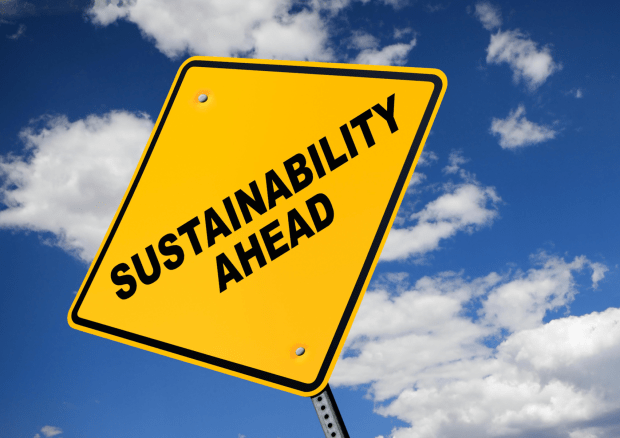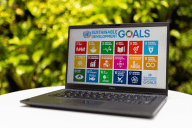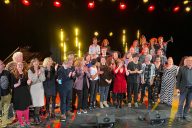In today’s rapidly changing world, the concept of sustainability has become central in higher education and the broader society. Sustainability is a multifaceted term that encompasses environmental stewardship, social equity, and economic prosperity.
What does sustainability mean to us teachers?
As educators, we are uniquely positioned to nurture a deeper understanding of sustainability among our students and inspire them to become catalysts for positive change. But what does sustainability mean to us teachers? How can we go beyond mere organizational strategy and embrace sustainability in our work that is meaningful and impactful?
In the upcoming months, Metropolia’s Sustainability in Education team will embark on a journey of exploration and storytelling, as we share our experiences and insights on sustainability in both our personal and professional lives. From the use of AI moodle plugins to other innovative approaches from our communities of practice, we aim to inspire and engage others, defining what sustainability means to us as teachers and providing possibilities to integrate our understandings into our educational practices effectively.
Understanding Sustainability in education
To understand the significance of sustainability, it’s crucial to trace its historical roots and evolution. Originating from the environmental activism of the late 1960s, sustainability initially focused on addressing pressing global issues such as climate change and resource depletion. Over time, its scope expanded to encompass not only environmental concerns but also social and economic dimensions. The adoption of the Sustainable Development Goals (SDGs) by the United Nations in 2015 marked a pivotal moment, emphasising the interconnectedness of environmental sustainability, social justice, and economic development. Our team has recognised that a holistic approach for sustainable development cannot be achieved in isolation but requires collaboration and collective action across sectors and disciplines.
We can instill a sense of responsibility and empower students to become active agents of change.
As educators, we play a pivotal role in shaping the attitudes, values, and behaviors of future generations. By integrating sustainability into our teaching practices and curriculum, we can instill a sense of responsibility and empower students to become active agents of change. This goes beyond mere dissemination of information; it requires fostering critical thinking, empathy, and a deep appreciation for the interconnectedness of all living beings, which our team will explore with the Inner Development Goals. By cultivating a culture of sustainability within educational institutions, we can nurture the next generation of leaders who are equipped to tackle complex global challenges with creativity and compassion.
Embracing Our Sustainable Journey together
Since its establishment in 2022, the Sustainability in Education team at Metropolia University of Applied Sciences has played a crucial role in translating sustainability strategy into actionable practices. Our team comprises educators from diverse fields of study, each bringing unique perspectives and expertise to the table. Dedicated to fostering dialogue that encourages teachers and students to engage in ways that align with their fields of study and personal values for a sustainable future, our team believes in the power of sharing stories and experiences to uncover new meaning, innovation, and possibilities for collaborative action.
Join us as we explore, reflect, and act on our shared commitment to building a more sustainable world.
As the team’s coordinator in 2024, I have initiated the collection of stories for this blog series, co-authored by a team member and myself. Additionally, we regularly convene at what we call ”Sustainability in Education Cafés” to share stories and discuss our activities towards sustainability. Join us as we explore, reflect, and act on our shared commitment to building a more sustainable world.
Together, let’s cultivate a culture of sustainability within education and beyond, ensuring a brighter and more equitable future for generations to come.
I would like to end this post with an InCANtation for sustainability in education, which I was inspired to write after my yearlong collaboration with the team in 2023:
Our world provides | So there is no reason to comply
To a system that is stuck | With a bunch of guck
Let yourself go | And every living system will flow
Life is not tragic | But alive with magic
Explore your dreams | And join teams
That co-create wonder | As luminous and magnificent
As lightning and thunder
Writer
Tricia Cleland Silva serves as the coordinator for the Metropolia Sustainability in Education team. She is a senior lecturer in the master degrees of Health Business Management and Leadership and Development in Nursing. She holds a PhD in Management and Organization. Her co-created method of Collaborative Story Craft and Story Mediation inspires her roles in sustainable development and inclusion within higher education and various communities of practice. She is also a parent, owns and runs a family business with her partner and an immigrant professional from Canada.
References
Cleland Silva, T. 2023. Teaching Sustainable Leadership Skills through Collaborative Storytelling. In Unkari-Virtanen, L., Kuusisto-Ek, H., & Brandt, T. (eds). Tulevaisuudenkestävä bisnes — ratkaisuja kompleksisuuden haasteisiin. Konferenssi 27.4. 2023: 186-190. TAITO-sarja 117. Metropolia Ammattikorkeakoulu.
Cleland Silva, T. & Fonseca Silva, P. 2022. Making Sense of Work through Collaborative Storytelling: Build narratives for organizational change. Switzerland: Palgrave MacMillian.









Ei kommentteja